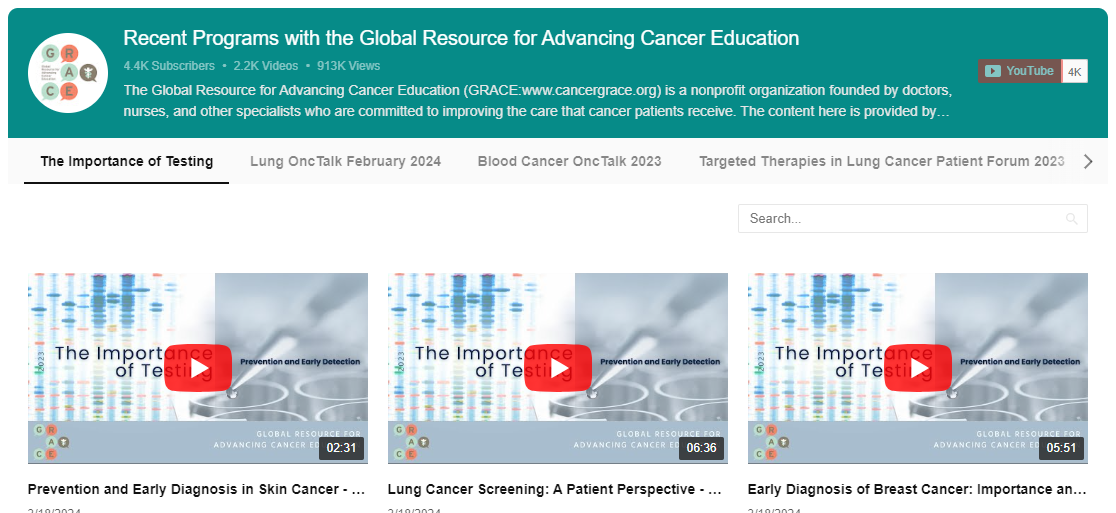Article and Video CATEGORIES
Please Note: New Treatments Have Emerged Since this Original Post

Dr. Nathan Pennell, Cleveland Clinic, reviews the available trial evidence for the use of targeted therapies in the post-operative/adjuvant setting.
Transcript
I’d like to talk to you now about adjuvant treatment with molecularly targeted therapies for non-small call lung cancer. We know that early stage patients, so patients with stage I, II, or III non-small cell lung cancer — many patients are cured with surgery, but unfortunately, many patients go on to recur with metastatic disease. The reason this happens is that some of the cancer cells have escaped from the tumor before surgery and spread elsewhere in the body. This is called microscopic metastatic disease, and for this reason, we offer patients at high risk of occurrence adjuvant therapy. Adjuvant just means that we give four cycles of chemotherapy after surgery, and we know that this provides a modest, but significant improvement in cure rates after surgery alone.
Well, what about for patients who have molecularly defined subgroups of cancer, like EGFR mutation-positive cancer, or ALK-positive cancer? We know that, in the advanced setting, targeted therapies like Tarceva or Gilotrif for EGFR-positive cancer, or crizotinib or Xalkori for ALK-positive lung cancer, are better than chemotherapy in terms of inducing tumor responses, delaying the progression of cancer, and potentially even improving overall survival.
Since they work in the advanced setting, wouldn’t it make sense that they might work better in the adjuvant setting as well? Well, it’s not quite that simple. For one thing, we don’t have any evidence for any type of molecular subgroup, other than EGFR mutation-positive patients, but even in that setting, we really don’t have good evidence that adjuvant therapy improves cure rates after surgery alone. We have a little bit of evidence, so we know that the doctors at Memorial Sloan Kettering Cancer Institute in New York have treated several hundred patients with adjuvant Tarceva after surgery and they’ve reported that the patients have probably a lower than expected recurrence rate compared to what we might expect for that risk of patients, and they’ve suggested that maybe even they’re improving cure rates with adjuvant Tarceva.
Unfortunately, you can’t draw conclusions from a retrospective series and not a prospective trial. There have been at least two prospective trials that have been done, including one phase II trial that treated patients with two years of adjuvant Tarceva after surgery and then a subgroup of patients from a phase III trial called the RADIANT trial — so these were not EGFR mutation-positive patients in the overall trial, but there were 160 mutation-positive patients on the trial who were treated with two years of Tarceva, or two years of a placebo. All of these put together have suggested that adjuvant Tarceva does potentially delay the recurrence of cancers, but once the adjuvant treatment stopped, many patients went on to recur at a later time. None of the trials have suggested that patients lived longer or were cured at a higher rate than patients who were treated with standard treatment, including adjuvant chemotherapy.
What we really need is a randomized prospective phase III trial. Luckily, there is one that’s open and enrolling called the ALCHEMIST trial. Patients with stage IB, II, or III non-small cell lung cancer are tested for EGFR mutations or ALK gene fusions, and if those are found, they’re randomly assigned to two years of Tarceva for EGFR, or Xalkori for ALK-positive lung cancer patients, or two years of a placebo. Hopefully, at the end of this trial we’ll know whether patients are cured at a higher rate when treated with these adjuvant target therapies, versus just delaying the recurrence of the cancer.
For now, in 2015, I would not routinely recommend adjuvant therapy with a targeted drug like Tarceva or Xalkori outside of a clinical trial, but would strongly encourage patients to enroll in the ALCHEMIST trial.
Please feel free to offer comments and raise questions in our
discussion forums.
Forum Discussions
Waiting for my appointment with oncologist this morning. Thank you for the response. It helps. <3
It sounds like you’re thinking of this in a very appropriate way. Specifically, it sounds like the growth of the nodule is rather modest, though keep in mind that the change...
Hi and welcome to GRACE. I'm sorry your mom is having this difficulty. An indwelling catheter is used when the pleura space continually fills and the catheter is always there to...
Hi Oaktowngrrl, Welcome to Grace. I'm so sorry you're going through this.
Finding a reputable dedicated thoracic surgeon for lung surgery might be difficult, as it is a complex and...





Hi Blaze,
As much as I hate to say it, Welcome back Blaze. It sounds like you're otherwise feeling good and enjoying life which is a wonderful place to be. ...